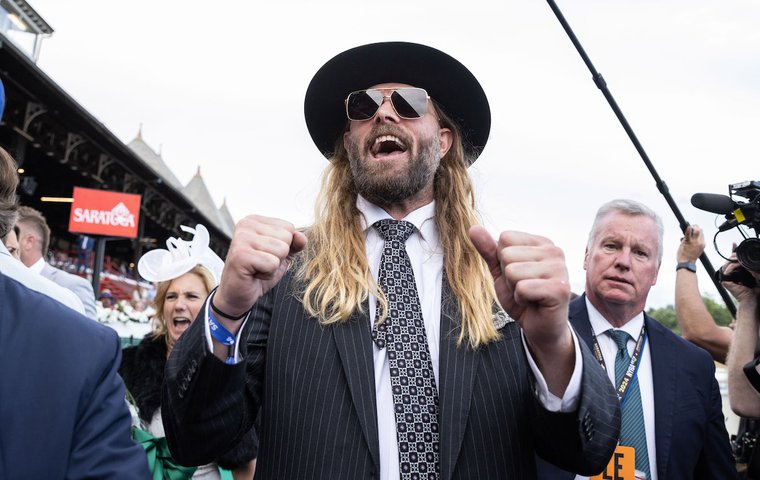
Former World Series champion is a part-owner in Belmont Stakes hero Dornoch, who claimed top spot in the three-year-old division with a game victory in the G1 Haskell at Monmouth Park on Saturday [July 21]
Celebrity has always been attracted to horse racing. Bing Crosby was instrumental in opening Del Mar and owned a string of horses, Fred Astaire owned Hollywood Gold Cup winner Triplicate, and Hollywood Park was knee-deep in A-Listers, such as Frank Sinatra and Larry Hagman on the inaugural Breeders’ Cup day.
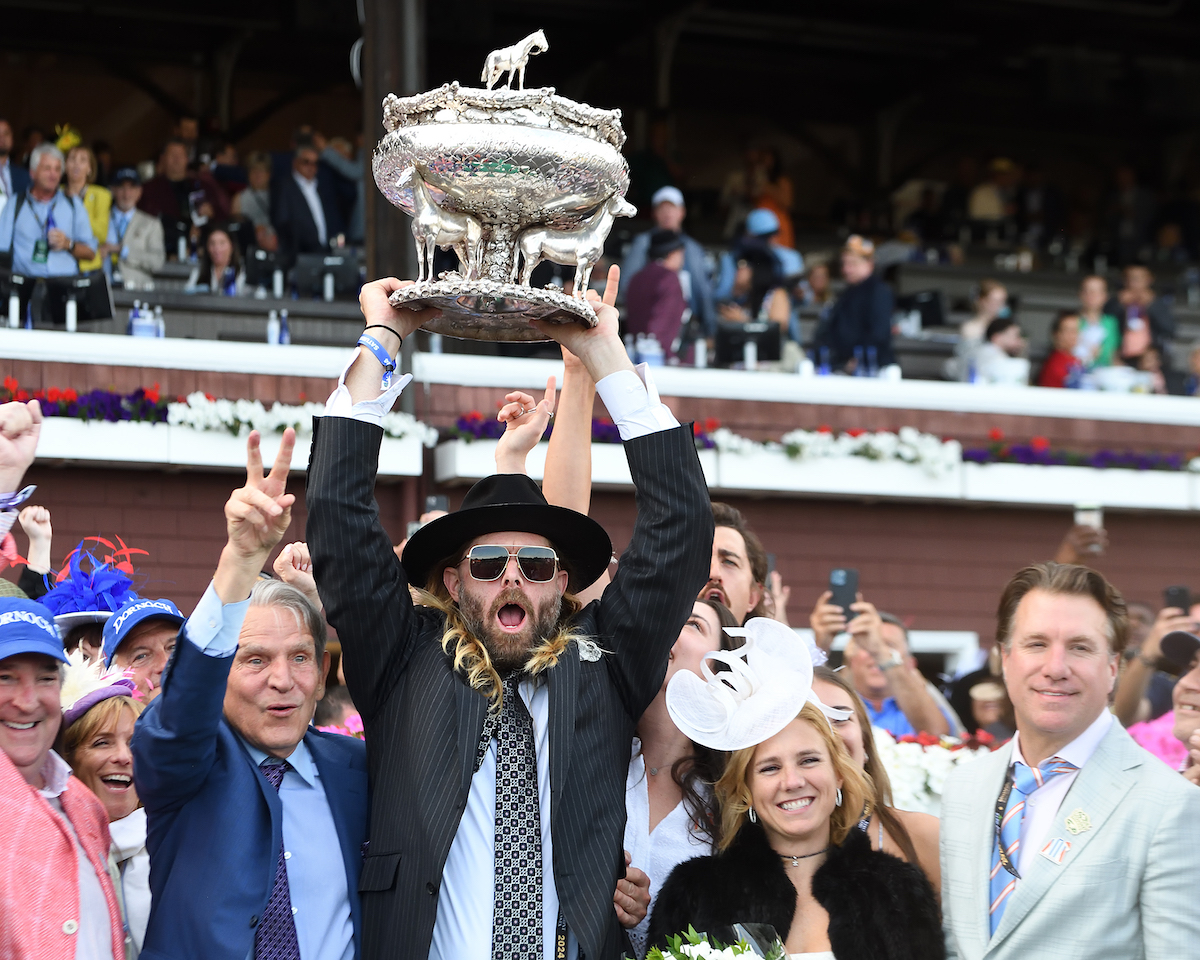 Bing was not just a pretty voice; Fred could dance a little; Frank and Larry had their moments. To paraphrase F Scott Fitzgerald, who surely went to the track now and again, ‘the very famous are different from you and me’.
Bing was not just a pretty voice; Fred could dance a little; Frank and Larry had their moments. To paraphrase F Scott Fitzgerald, who surely went to the track now and again, ‘the very famous are different from you and me’.
Not all of them, though. Some turn out to have the same compulsive fascination for racing as the rest of us who climb up into the grandstands.
Here’s Jayson Werth, the part-owner of Belmont Stakes winner Dornoch, whose relish for the second act in his glittering sporting life is indisputable, invigorating, infectious.
The former Major League Baseball celebrity, a World Series winner, an All-Star player, looked the coolest dude on the Saratoga grounds when he lifted the big silver Belmont trophy above his head – black hat, dark shades, long hair hanging down – but appearances may be deceptive. He was a nervous wreck.
“It was weird,” says Werth, 45, the happy memory still morning fresh. “I never got nervous when I was playing baseball, I had the cold mentality, the focus, always ready for the clutch points.
“Racing? The exact opposite. Racing brings me emotions I can’t handle, can’t deal with. It’s like I’m having a nervous breakdown, never felt anything like it.
“Before the Belmont I was in such a state I couldn’t even get my bets on. I had all my exotic exacta bets in mind, knew what I wanted to do, but I couldn’t do it. I couldn’t think. My hands were shaking. I just managed to get win, place, show down on Dornoch and that was all I could do.
‘Awesome, addictive – it means so much’
“That’s the effect racing has on me, awesome, addictive. It means so much.”
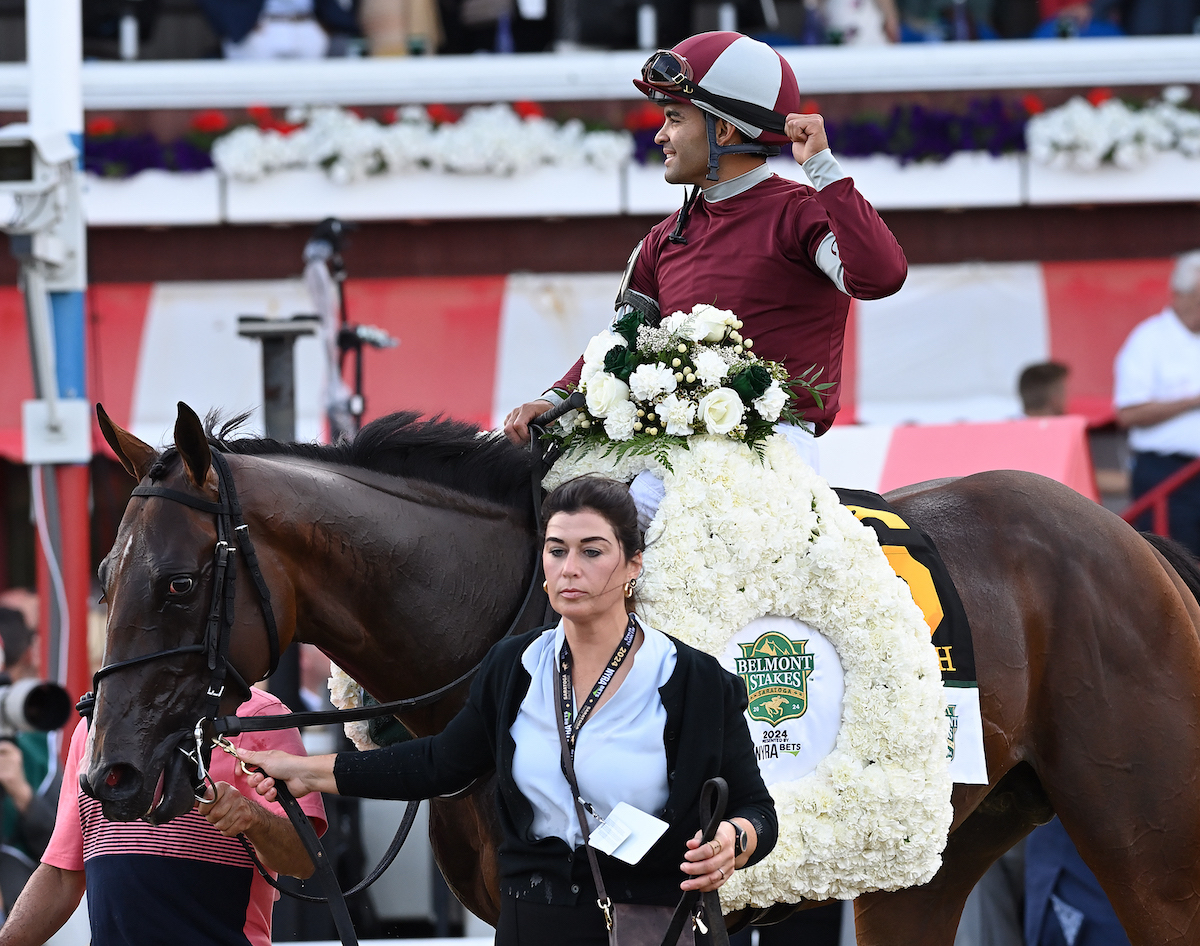 Racing is a sport that sometimes struggles for positive public perception, so such celebrity endorsement and genuine enthusiasm is gold dust for its image. Famous guy likes the ponies is catnip for social media but there’s the danger it can tend to the superficial, ‘here today, gone later today’ in these attention-light times.
Racing is a sport that sometimes struggles for positive public perception, so such celebrity endorsement and genuine enthusiasm is gold dust for its image. Famous guy likes the ponies is catnip for social media but there’s the danger it can tend to the superficial, ‘here today, gone later today’ in these attention-light times.
So there was an undeniable power in Werth’s comments in the hot minute after Dornoch nailed the Belmont, his words resonating well beyond the usual soundbite racetrack platitudes. They came from the heart, from way back in his sporting psyche. It was Werth talking, not his PR machine.
“I’ll put it up there with anything I’ve ever done,” he told the press pack. “Horse racing is the most underrated sport there is. This is as big as it gets. It’s the same emotions you feel when you play a playoff game, when you win a World Series game, when you win a World Series.”
Werth knows well of which he speaks. He had a stellar career on the baseball diamond, 16 years in the outfield, 229 home runs, a World Series with the Philadelphia Phillies. His ball-playing heroes as a child in central Illinois were his family: he grew up listening to stories about his grandfather playing alongside the luminous Willie Mays, and his uncle also won a World Series.
‘Always thought horses were cool’
But alongside boyhood dreams of the bottom of the ninth, two men out, a two-three count and himself on home plate were the seeds of something else.
“I always thought horses were cool, I was always a little bit interested in them,” he says. “When I was 11, 12 I worked on a horse farm down the road – well, I wasn’t old enough to work so I just helped the guy out.
“Feeding them apples was a big part of what I did. They were my exotic pets, really.”
And now he has 22 exotic pets, some all his own, most shared with others like the ten per cent stake he has in Danny Gargan-trained Dornoch, who added to his burgeoning reputation with a grittily impressive victory in the G1 Haskell to give himself clear water at the head of the three-year-old colt division before next month’s defining Travers back at Saratoga.
Werth was on hand, of course, in his role as number one member of the Dornoch fan club. “He’s an incredible guy, incredible horse,” he said, speaking on the NBC broadcast from the New Jersey venue. “He’s a cool dude. We love this guy. He’s like a family member.”
That said, evidently Werth was no less anxious than he’d been at the Belmont. “These races are so stressful,” he said. “They’re so amazing and then you run and there’s so much at stake, and then he wins, and you freak out, you go crazy. It’s an unbelievable game.”
Werth keeps track of his equine empire on a whiteboard at home, coloured marker-pens at the ready to catalogue the pleasure that has inexorably become a business called Two Eight Racing, commemorating his baseball number.
‘What else can I buy?’
“I couldn’t help myself, I dived deep. It was like ‘what else can I buy?’,” he says. “Then of course the bills started coming in, but my wife Julia understands it, understands what I’m doing.”
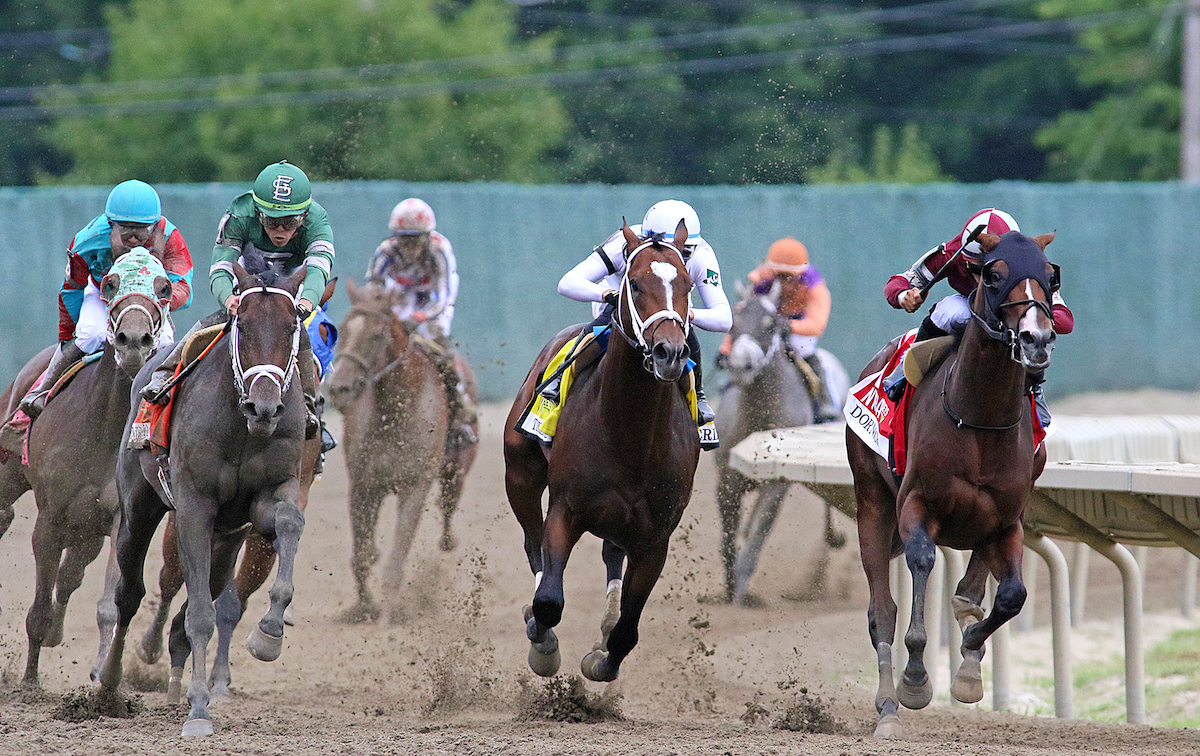 Racing has swiftly become the Werth family pastime. His sons Jackson and Judah have caught the bug, his wife is a big fan. “It’s a fun thing we can all do together,” he says, and that simple statement speaks volumes for a man in his position, the retired sports star, thrust back into civilian life with the overwhelming problem of trying to find something, anything to replace the all-consuming win-or-bust sensibility of competition.
Racing has swiftly become the Werth family pastime. His sons Jackson and Judah have caught the bug, his wife is a big fan. “It’s a fun thing we can all do together,” he says, and that simple statement speaks volumes for a man in his position, the retired sports star, thrust back into civilian life with the overwhelming problem of trying to find something, anything to replace the all-consuming win-or-bust sensibility of competition.
Werth talks lucidly, eloquently about the issue, and about the solution to it that fell into his path in 2021 after a round of golf, when his playing partner tuned in the clubhouse television to the racing, turned him on.
“I had the usual once-a-year interest in the Kentucky Derby, like everyone, but no knowledge of the actual sport,” he says. “I thought the live racing had to be a replay, didn’t know they raced in midweek. But my friend Richard Averill, who I’d just played golf with, had horses so I bought into a couple.”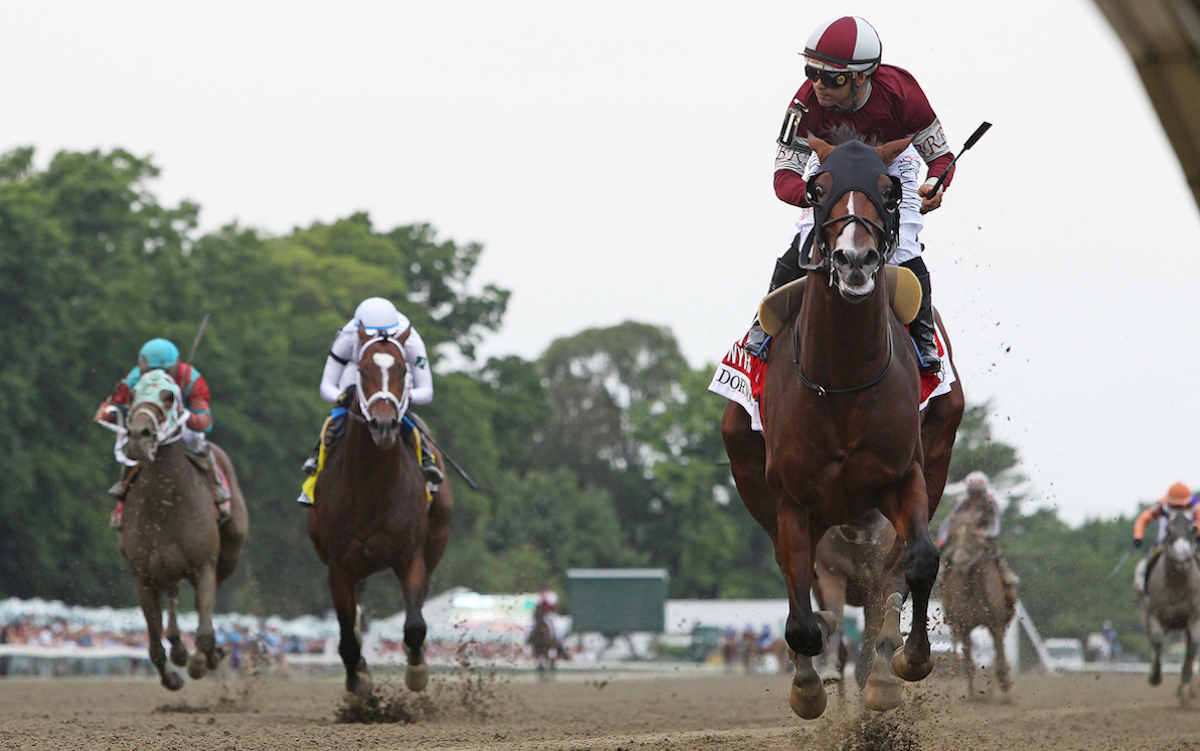
It could have been a slippery slope, but it became an exhilarating ascent. One of Werth’s buy-ins was dual G3 winner R Calli Kim – “She was a winning machine, and is now in-foal to Flightline” – and he quickly discovered there was more to the experience than he had imagined.
“I took a bunch of friends to Churchill Downs to watch ‘Kim’ race for Richard,” he remembers. “It was just an allowance race and it rained so they took it off the turf, but we decided to run her anyway. And she won!
‘Missing this in my life’
“To my buddies from a small town back home, Churchill Downs was like the Sistine Chapel, and to see that effect on them – as well as the effect it had on me – really was something.
“In other sports, your family is separate from what you do – you might see them in the grandstands, but you have to be with whoever happens to be on your team.
“But in racing your family is with you. You choose the people you want to be around, they become your friends, it’s one big family, you win or lose with them, win or lose together. I hadn’t realised, until I started out in racing, that I was missing this in my life.”
If he was missing it, it stands to reason that others are dealing with the same emotions, and Werth, afire with the missionary zeal of the newly converted, is developing ideas to sell the sport to former athletes, emphasising its possibilities.
“There’s a big difference between betting on racing and being a part of it, owning a horse, living the dream,” he says. “That’s the angle I have now, that’s what I’m working on – so many retired athletes have no idea what to do next, so I can show them this opportunity, these experiences.”
 Werth had a long, immersive career in America’s national sport, based in Toronto, Los Angeles, Philadelphia and Washington before his time in the majors ran through the hourglass.
Werth had a long, immersive career in America’s national sport, based in Toronto, Los Angeles, Philadelphia and Washington before his time in the majors ran through the hourglass.
‘Not just a job’
He wasn’t ready to give it up, spent a year in Seattle in Triple-AAA (the minors) territory before his body sent him a message he couldn’t ignore.
“Baseball was a passion for me, not just a job,” he explains. “I went on a great journey, showed up every day and worked as hard as I could and I loved it. It was more than I could have dreamed of.
“But when it was over in the majors, it was over. Time goes by quick and you don’t realise it. I went out to Seattle because I didn’t want it all to be over, played some games for Tacoma, but the day I was due to go back up [to the majors] I pulled a hamstring, and it was a bad one. Something was telling me I was done.”
Then the almost unanswerable question; what next? Werth left baseball in 2018, took time out on the organic farm he’d started up a decade earlier as somewhere to decompress from the day job – “Corn, beans, wheat, cover crops for green manure, no chemicals, no pesticides, no synthetic fertilisers” – while seeking something to repurpose the competitive mindset honed by all those years at the ballpark. A game of golf; a clubhouse television; the answer came zinging out of left field.
“Now racing has taken over my life, has become an obsession,” he says. “I can’t get enough. Racing has filled a void in my life that I thought was almost unfillable. In my professional career I played big games for good teams and won championships, and I didn’t think I would be able to replace the feeling of competition at that level.
“But that is what horse racing is like,” he adds. “It means so much. Now I get competitive at auctions buying horses, get competitive at the track racing them. It’s all on the line out there for everyone involved, and anything can happen. It just blows my mind.”
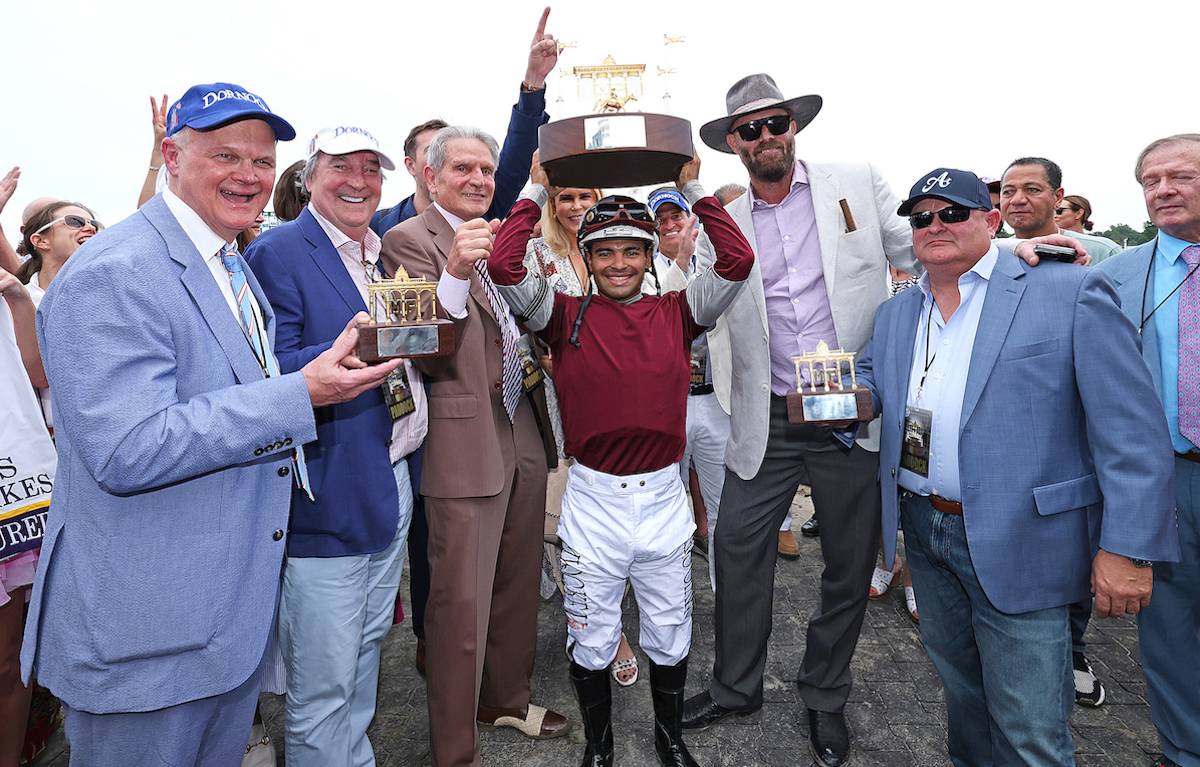
Playing golf didn’t do it for Werth but, as well as providing a route into racing, that proverbial good walk spoiled decorates the background of his pride and joy Dornoch, who he calls Big Puppy for his amiable nature.
“My friend Chase Utley who played for the Phillies, he’s living in London now and I went over to see him,” says Werth. “I got fitted for a few suits in Savile Row, just the thing for when I have a runner at Royal Ascot, and we played some golf in Scotland.
“One day I called Danny Gargan and he told me he’d chosen a name for our Good Magic colt. Dornoch, he said. A day or two earlier I’d been playing golf at Royal Dornoch – how weird is that? And then he goes and wins the Belmont. Storybook stuff.”
‘A wild, wild ride, a fairytale’
Werth has been extremely fortunate to make such an overnight success of ownership, striking gold with practically the first swing of the pickaxe, and he is well aware of his luck. A long career in professional sport makes for easy acquaintance with many forms of triumph and disaster, and he recognises that today’s glory can easily turn into tomorrow’s heartache.
“Some people say I should retire now,” he says. “Look, I know I’m blessed right now. It’s not lost on me. It’s been a wild, wild ride, a fairytale.
“I’m going to stay in the game, hopefully keep going forward, perhaps take a different approach here and there, go to a different level. Now that Dornoch is heading for a stallion career [with Spendthrift Farm] I’m looking at the breeding side, another new angle.
“At the beginning I didn’t know what I was doing. Now it’s become more of a business and it’s a lot of fun, so exciting to find out where it’s going to take me.”
Bing sang, Fred danced. Werth’s level of fame isn’t halfway comparable, but his involvement in racing has put a song in his heart, a spring in his step.
Not so very different from you and me after all.
• Visit the Belmont Stakes website and the Monmouth Park website
View the latest TRC Global Rankings for horses / jockeys / trainers / sires


